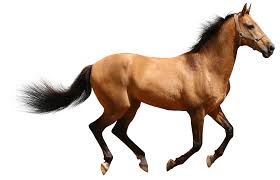horse
英 [hɔːs]
美 [hɔːrs]
- n. 马;骑兵;脚架;海洛因
- vt. 使骑马;系马于;捉弄
- vi. 骑马;作弄人
- n. (Horse)人名;(瑞典)霍尔瑟
使用频率:

中文词源
horse 马
来自古英语hors,马,来自Proto-Germanic*hursa,跑动,来自PIE*kurs,跑,词源同car,current.引申词义马。比较equine.
英语词源
- horse
-
horse: [OE] The Germanic languages have gone their own way as far as the horse is concerned. The prehistoric Indo-European term for the animal was *ekwos, which produced Latin equus (source of English equestrian and equine), Greek híppos (whence English hippodrome and hippopotamus), Sanskrit açvás, and Old English eoh. Remarkably, though, this has virtually died out as the day-to-day word for ‘horse’ in the modern European branches of the Indo- European languages.
In the case of English, it has been replaced by a descendant of prehistoric Germanic *khorsam or *khorsaz: horse (German ross, now mainly a literary term equivalent to English steed, is related). Its source is not known, although some have linked it with Latin currere ‘run’.
- horse (n.)
- Old English hors, from Proto-Germanic *hursa- (cognates: Old Norse hross, Old Frisian hors, Middle Dutch ors, Dutch ros, Old High German hros, German Roß "horse"), of unknown origin, connected by some with PIE root *kurs-, source of Latin currere "to run" (see current (adj.)).
The usual Indo-European word is represented by Old English eoh, from PIE *ekwo- "horse" (see equine). In many other languages, as in English, this root has been lost in favor of synonyms, probably via superstitious taboo on uttering the name of an animal so important in Indo-European religion.
Used since at least late 14c. of various devices or appliances which suggest a horse (as in sawhorse). To ride a horse that was foaled of an acorn (1670s) was through early 19c. a way to say "be hanged from the gallows." Slang for heroin is first attested 1950. Horse latitudes first attested 1777, the name of unknown origin, despite much speculation. Dead horse as a figure for "something that has ceased to be useful" is attested from 1630s.HORSEGODMOTHER, a large masculine wench; one whom it is difficult to rank among the purest and gentlest portion of the community. [John Trotter Brockett, "A Glossary of North Country Words," 1829]
The horse's mouth as a source of reliable information is from 1921, perhaps originally of racetrack tips, from the fact that a horse's age can be determined accurately by looking at its teeth. To swap horses while crossing the river (a bad idea) is from the American Civil War and appears to have been originally one of Abe Lincoln's stories. Horse and buggy meaning "old-fashioned" is recorded from 1926 slang, originally in reference to a "young lady out of date, with long hair." - horse (v.)
- Old English horsian "to provide with a horse or horses," from horse (n.). Related: Horsed; horsing. Sense of "to play excessive jokes on" is by 1893, mostly in formation horse around (1928), perhaps from horseplay.
[A] favorite pastime for many men is to "horse" or guy a friend who has shown himself susceptible to ridicule or fun making. "Horsing" is extremely wholesome mental discipline for over sensitive or super-conceited young men. "Horsing" always implies a joke at another's expense. As to how it came into use there is no satisfactory theory to offer. ["Yale Literary Magazine," December 1893]
权威例句
- 1. I let the horse drop his head to crop the spring grass.
- 我让马低下头啃吃春天的青草。
- 2. Representatives from across the horse industry will attend the meeting.
- 整个赛马业的代表都将参加这次会议。
- 3. Last night we hitched the horse to the cart and moved here.
- 昨晚我们套上马车,拉着东西搬到了这里。
- 4. Lindsay was unhurt but the horse had to be destroyed.
- 林赛没有受伤,但那匹马却不得不被人道毁灭。
- 5. The horse made a winning start for his new trainer.
- 这匹马为它的新驯马师开了个好头。
